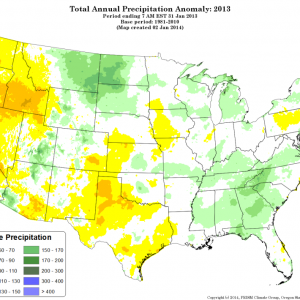Federal Water Tap, January 6: 2014 Preview
In a normal week, I use this space to look back at U.S. government water news from the seven days that have just passed. Today, however, I turn the lens in the opposite direction.
These are the policies, reports, and decisions to anticipate in 2014, organized chronologically, more or less.
Great Lakes
The government gets up to speed quickly. Today, January 6, the Army Corps of Engineers will release a final report on how to deal with the spread of Asian carp and other aquatic invasive species from the Mississippi River Basin into the Great Lakes. The Obama administration has spent $US 200 million since 2009 to stymie the fish, including electronic and physical barriers in waterways. The report being released today was ordered by Congress in 2007.
Laws
Two major water-related laws are more than a year past due but are closer to completion. The farm bill and the water resources development bill are in conference committees where differences between House and Senate versions will be smoothed.
The farm bill controls the federal purse strings for more than 20 agricultural conservation programs, some of which affect water quality. The water resources bill is the main authorizing legislation for projects undertaken by the Army Corps of Engineers. Both bills offer change. The farm bill consolidates conservation programs and cuts their overall budget by several billion over 10 years. The House version of the water resources bill revokes $US 12 billion in funding for projects that have not broken ground, and it includes provisions for quickening the pace of environmental reviews, to the chagrin of green groups.
Ag Census
Every five years, the U.S. Department of Agriculture gathers a comprehensive set of statistics on the nation’s farm economy and practices, called the Census of Agriculture. The most recent data, from 2012, will be published in February.
Bristol Bay
Early in 2014, the U.S. Environmental Protection Agency will release a final report on the ecosystem effects of a proposed copper mine in Alaska’s Bristol Bay watershed. The watershed is the world’s most productive wild sockeye salmon run. A draft report published last year outlined the stream and wetland habitat losses that could be expected based on three mine sizes. The report did not consider the effects of secondary construction: a deepwater port to transport the raw material, a power plant to fuel the mine, or general economic development in the region.
Supreme Court
Three cases are in various stages before the nation’s highest court. The court will decide whether it should take up Texas’s complaint that groundwater use in New Mexico is taking away from its share of the Rio Grande. The federal government’s legal counsel argues that Texas has shown sufficient evidence for the case to proceed.
A court-appointed “special master” will submit recommendations to the court for resolving a dispute between two states in the northern plains. Montana claims that mining the methane trapped in coal seams in Wyoming is reducing the amount of water that should flow down the Tongue River. To release the gas, large volumes of groundwater are pumped out of the surrounding rock formations.
And one case will see a ruling from the Supreme Court itself. A long-running dispute between Kansas and Nebraska over the Republican River was already sent to a special master, who ruled largely in favor of Nebraska. The court will decide whether to endorse the recommendations.
USGS Water Use Report
In mid-2014, the U.S. Geological Survey will release a much-delayed report on water use in the United States. The new report, with data from 2010, will go into greater detail than before on water withdrawals by the thermoelectric sector. For the first time since 1995, the report will track the water consumed by power plants.
Fracking Report
By the end of the year, the EPA will release a draft report on how drinking water is being affected by fracking, the natural gas production technique that, in combination with horizontal drilling, has pushed the U.S. to the top of global energy ranks. Congress ordered the study in 2010.
Federal Water Tap is a weekly digest spotting trends in U.S. government water policy. To get more water news, follow Circle of Blue on Twitter and sign up for our newsletter.
Brett writes about agriculture, energy, infrastructure, and the politics and economics of water in the United States. He also writes the Federal Water Tap, Circle of Blue’s weekly digest of U.S. government water news. He is the winner of two Society of Environmental Journalists reporting awards, one of the top honors in American environmental journalism: first place for explanatory reporting for a series on septic system pollution in the United States(2016) and third place for beat reporting in a small market (2014). He received the Sierra Club’s Distinguished Service Award in 2018. Brett lives in Seattle, where he hikes the mountains and bakes pies. Contact Brett Walton






Leave a Reply
Want to join the discussion?Feel free to contribute!